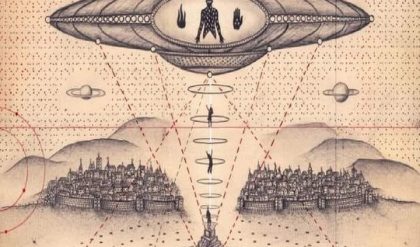The vastness of the universe has long inspired speculation about the existence of intelligent life beyond Earth. As humanity delves deeper into the cosmos, a provocative idea has emerged in the realm of science fiction and conspiracy theories alike: that Earth is not just a solitary planet but a participant in a complex web of cosmic alliances and interstellar conflicts. The notion of a “Galactic Accord”—a diplomatic arrangement among alien civilizations—suggests that these alliances play a crucial role in shaping the destiny of our planet.
The Concept of the Galactic Accord


The idea of a Galactic Accord posits that advanced extraterrestrial civilizations have formed a network of alliances, akin to interstellar governments or coalitions, to maintain peace and stability across the galaxy. Earth, as a developing planet with emerging technological capabilities, might be considered part of this broader cosmic community, either as a protected entity or as a potential ally.
Key Features of the Galactic Accord
Interstellar Diplomacy: According to this concept, alien civilizations engage in diplomacy similar to how nations on Earth interact. These interstellar agreements might include non-aggression pacts, trade agreements, and mutual defense treaties designed to prevent conflict and promote cooperation among different species.
Earth’s Role: Earth could be seen as a unique entity within this accord—perhaps due to its biodiversity, strategic location, or potential as a future ally. Some theorists suggest that Earth is under the protection of more advanced civilizations, which monitor our progress and intervene only when necessary to prevent global catastrophe.
Cosmic Laws: The Galactic Accord might include a set of cosmic laws that govern interactions between civilizations, including restrictions on interfering with less advanced planets (a concept often referred to as the “Prime Directive” in science fiction). These laws could be designed to ensure that emerging civilizations develop at their own pace, free from undue influence.
Interstellar Conflict and Its Impact on Earth
While the idea of a peaceful Galactic Accord is appealing, it is also possible that interstellar conflicts arise among these cosmic powers, with potential repercussions for Earth. The concept of such conflicts introduces a darker element to the narrative, suggesting that our planet could become a battleground or a strategic asset in a larger cosmic struggle.
Scenarios of Cosmic Conflict
Territorial Disputes: Just as nations on Earth have fought over territory, alien civilizations might engage in conflicts over regions of space rich in resources or possessing strategic importance. Earth could find itself caught in the crossfire of such disputes, especially if our solar system is located in a contested region.
Technological Superiority: Advanced civilizations might compete for dominance through superior technology, including weapons of mass destruction or advanced AI. Earth could be vulnerable to such technologies, either as a target or as a pawn in a larger game of interstellar power.
Cultural Assimilation: Beyond military conflicts, cultural and ideological clashes could also play a role in shaping Earth’s destiny. Civilizations with differing values and beliefs might seek to influence or assimilate emerging planets like Earth, leading to potential cultural and societal upheaval.
Historical and Mythological Parallels
The idea of cosmic alliances and conflicts shaping Earth’s destiny is not entirely new. Throughout history, various cultures have envisioned the heavens as realms of gods and cosmic beings whose actions directly influence life on Earth.
Ancient Mythologies
The Annunaki: Sumerian mythology speaks of the Annunaki, powerful deities who were believed to have descended from the stars to govern humanity. Some interpretations suggest that these beings could have been extraterrestrial visitors who played a role in shaping early human civilization.
The Vedic Devas and Asuras: In Hindu mythology, the Devas (gods) and Asuras (demons) are engaged in an eternal struggle for control of the universe. This cosmic battle, mirrored in the heavens, is believed to affect the fate of humanity, with Earth caught in the balance.
Modern Ufology
The Galactic Federation: In contemporary UFO lore, there is often mention of a “Galactic Federation”—a coalition of alien species working together for the greater good of the galaxy. Proponents of this idea believe that Earth is under the watchful eye of this federation, which seeks to guide humanity towards peace and enlightenment.
Contactee Accounts: Some individuals claim to have been contacted by extraterrestrial beings who speak of a cosmic community or federation. These accounts often describe Earth as a crucial player in a larger cosmic plan, with humanity’s actions having far-reaching consequences beyond our planet.
The Future of Humanity in a Galactic Context
Whether viewed as a myth, a conspiracy theory, or a speculative possibility, the concept of a Galactic Accord invites us to consider humanity’s place in the universe in a broader context. If such cosmic alliances and conflicts do exist, they could have profound implications for our future.
Potential Outcomes
Peaceful Integration: If Earth is indeed part of a Galactic Accord, our future could involve peaceful integration into a larger cosmic community. This could lead to technological advancements, cultural exchanges, and a new era of exploration and discovery.
Defensive Measures: In the face of potential interstellar conflict, humanity might need to develop advanced defense systems and strategies to protect our planet. This could include alliances with other friendly civilizations or the development of our own spacefaring capabilities.
Existential Threats: The possibility of Earth becoming a target in a cosmic war raises existential concerns. Humanity may need to confront the reality that our survival could depend on navigating the complexities of interstellar politics and diplomacy.
Conclusion: The Allure of the Cosmic Narrative
The idea of a Galactic Accord and its influence on Earth’s destiny captures the imagination because it taps into our deepest questions about the universe: Are we alone? If not, how do we fit into the grander scheme of cosmic events? While these ideas remain speculative, they challenge us to think beyond our planet and consider the possibilities that lie beyond the stars.
As we continue to explore the cosmos, the allure of these cosmic narratives will undoubtedly persist, inspiring both wonder and caution as we seek to understand our place in an ever-expanding universe. Whether or not we ever discover the truth behind these stories, they remind us of the infinite possibilities that await humanity as we reach for the stars.





